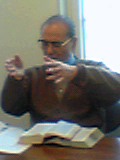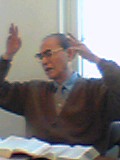As a young man in wartime Japan Mr Kubota was considered unfit for military service because of his weak lungs. But by 1945 the need for new recruits had grown so desperate that even Mr Kubota, weak lungs and all, was considered fit enough for military service.
He was told that he would be drafted into the military on 15th August 1945. In the meantime he was working for the Hiroshima City government demolishing houses in the centre of Hiroshima. Why were houses being demolished?
“American air raids on the mainland had already devastated most of Japan’s major cities. In preparation for such raids, Hiroshima City was creating a firebreak 100 metres wide running east and west across the centre of the city. Buildings in the firebreak area were being demolished block by block.
“On August 6, a special district guard corps composed mainly of temporarily drafted elderly veterans, many units of community and workplace volunteer citizen corps from around the city and surrounding counties, and the student corps (mobilized students), mostly 12 or 13 years old… They began demolishing buildings early in the morning.
“To demolish the buildings, soldiers and adults in the volunteer citizens corps removed the roof tiles, cut the support pillars with saws, tied ropes to the pillars, then pulled the structure down. Clearing up the collapsed building was the work of mobilized students.”
Mr Kubota was inside one of these houses when the bomb exploded. I believe he was near Miyukibashi, a bridge about 2 miles South East of the epicentre. He told me that he heard an enormous bang…
… The next thing he remembers is that he was that the house had collapsed on top of him but that he was able to escape through a gap in the roof and from here he was able to escape the raging fires and go back home on the other side of Hijiyama, a hill on the South East side of the city. The buildings on the East side had been protected from the blast by the hill.
Ironically, Mr Kubota believes that the atom bombs that were dropped on Hiroshima and Nagazaki actually saved his life because Japan surrendered on 15th August, thus releasing him from military service, due to commence that day. He believes that had he been sent abroad he would never have returned.
However, in the years following the war the effects of the bombing seem to have aggravated Mr K’s lungs and in the 1950s he had to undergo major surgery and had eighty percent of one lung removed and has an operation scar which runs the length of his back.
Until he returned to Hiroshima after he retired in the late 1980’s Mr K worked as a civil servant in various cities the length and breadth of Japan.
After retiring, Mr Kubota decided to study English so that he could communicate with foreigners about peace and Japanese culture. He therefore began to take a weekly private class at a Japanese language school in Hiroshima. A former colleague of mine, Paul Bradbury gives his impression of teaching Mr Kubota…


Teaching Mr K
by
Paul Bradbury
Words cannot express the Kubota phenomenon – this a man who decided at the age of seventy that he wanted to learn English from scratch in order to inform the world about the Bomb, Hiroshima, Japanese culture, a man who wanted to put something back by educating the generations who came after him. He immediately became a cult figure in the school, the oldest student by a generation. Oddly, the majority of teachers shied away from teaching him, feeling that there was no point as he never learned anything.
After twelve years of paying thirty quid an hour once a week, even the most basic of English apparently evaded him. Some teachers took a different attitude, using the hour to catch up on their emails on their mobile phones under the desk as he spent ten minutes searching dictionaries for an elusive word. I had seen him enough to get an impression of a tall, thin, erect man, bespectacled and always sporting a floppy sun hat. I had seen him through classroom windows, always lost in thought, head back, right arm outstretched, as though pointing or trying to pick the words from the air. The teachers invariably gave me a wry smile and a nod as Kubota seemed oblivious to anything around him. After five months of begging the boss to let me have my turn, she finally relented with two weeks of my contract to go.
The floppy hat on a peg, I was surprised by his slicked back hair. He too was surprised to find he had a new teacher, but, upon rising, a smile came to his face as he realised that this was a chance to educate someone new. I had been forewarned that despite the twelve years of private tuition, his English was basic. I thought it best to let him speak first.
“How you… England… gray, gray… grating?”
At least I assume it was a question. “Grating. England grating.” Ok, it was going to be one of those lessons, interpreting pronunciation to infer what the student was getting at. “Grating,” he repeated, with more urgency,
“Grating, grating, grating…”
“Greeting?” I offered hopefully.
“Yes, yes. Grating. How you England grating?”
I guessed from this that he wanted me to tell him how people greet each other in English, something I thought he might have mastered in the previous twelve years, and was just going to give him some pointers, when I noticed the right arm being raised, the eyes closed in intense concentration and it was obvious that with some Herculean effort, he was searching deep for this important word. After a full minute (which is an extraordinarily long time for silence in the classroom), the arm lowered, the eyes opened, the face relaxed, and I was presented with the results of his efforts:
“Hello.”
From there he went from strength to strength. He wanted to introduce himself to me but in the first hour, I only established that he was 82 and that he was the oldest student in the school. My mistake was to point out that “I am 82 year old” was not quite correct but that “I am 82 years old or I am an 82 year-old man” was. Confusion reigned for a full twenty minutes until he was convinced that he was clear on the difference. He returned to the start of his introduction:
“I am 82 year old.”
I decided to let it pass and was rewarded by success in the second sentence, during which he announced that he was “the most old student” in the school. I thought it would be pushing it to introduce the rules for comparatives and superlatives (more beautiful but older, for example), but he got really into it and even remembered the following week, during which time he wanted to lecture me on the differences between English and Japanese sentence structure, as he burrowed through piles of exercise books, the fruits of twelve years’ toil, searching for the missing word. The fact that his Japanese – English word ratio was approximately 15:1 made it all the more entertaining, but I was not convinced by his arguments that English is more difficult than Japanese, simply because we say ‘Good morning’ and ‘Good afternoon’, terms which are covered by a single word in the “easier” Japanese language…
Paul Bradbury now lives in Croatia and runs http://www.total-croatia.com
